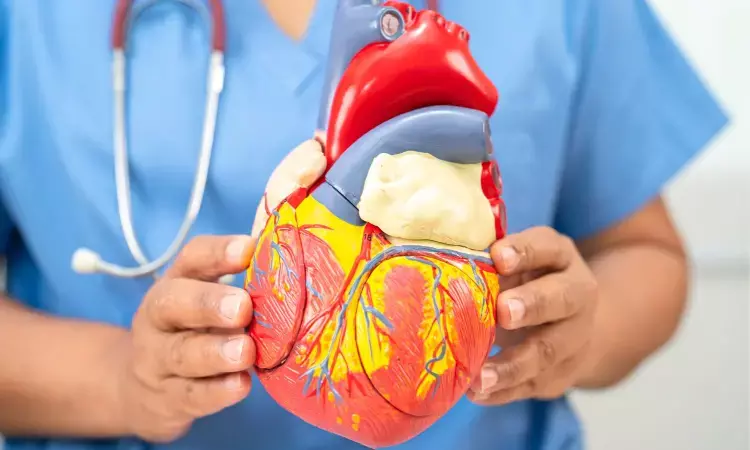- Home
- Medical news & Guidelines
- Anesthesiology
- Cardiology and CTVS
- Critical Care
- Dentistry
- Dermatology
- Diabetes and Endocrinology
- ENT
- Gastroenterology
- Medicine
- Nephrology
- Neurology
- Obstretics-Gynaecology
- Oncology
- Ophthalmology
- Orthopaedics
- Pediatrics-Neonatology
- Psychiatry
- Pulmonology
- Radiology
- Surgery
- Urology
- Laboratory Medicine
- Diet
- Nursing
- Paramedical
- Physiotherapy
- Health news
- Fact Check
- Bone Health Fact Check
- Brain Health Fact Check
- Cancer Related Fact Check
- Child Care Fact Check
- Dental and oral health fact check
- Diabetes and metabolic health fact check
- Diet and Nutrition Fact Check
- Eye and ENT Care Fact Check
- Fitness fact check
- Gut health fact check
- Heart health fact check
- Kidney health fact check
- Medical education fact check
- Men's health fact check
- Respiratory fact check
- Skin and hair care fact check
- Vaccine and Immunization fact check
- Women's health fact check
- AYUSH
- State News
- Andaman and Nicobar Islands
- Andhra Pradesh
- Arunachal Pradesh
- Assam
- Bihar
- Chandigarh
- Chattisgarh
- Dadra and Nagar Haveli
- Daman and Diu
- Delhi
- Goa
- Gujarat
- Haryana
- Himachal Pradesh
- Jammu & Kashmir
- Jharkhand
- Karnataka
- Kerala
- Ladakh
- Lakshadweep
- Madhya Pradesh
- Maharashtra
- Manipur
- Meghalaya
- Mizoram
- Nagaland
- Odisha
- Puducherry
- Punjab
- Rajasthan
- Sikkim
- Tamil Nadu
- Telangana
- Tripura
- Uttar Pradesh
- Uttrakhand
- West Bengal
- Medical Education
- Industry
FDA Expands Evolocumab Approval for Broad Cardiovascular Protection

Evolocumab (Repatha) is now approved for adults at increased risk of major adverse cardiovascular events, regardless of prior CVD history, marking a broader indication a decade after its initial launch.
The update removes a prior requirement for a patient to have been diagnosed with cardiovascular (CV) disease.
"Far too many adults at risk of cardiovascular disease are not achieving their LDL-C goals, despite it being one of the most modifiable risk factors for a heart attack or stroke," said Murdo Gordon, executive vice president of Global Commercial Operations at Amgen. "This label update highlights the real-world need for additional treatment options for at-risk patients. Repatha is an effective therapy for reducing LDL-C, particularly in patients whose disease remains uncontrolled with statins or who cannot tolerate them."
In addition to expanding Repatha's label to include adults at increased risk of MACE, the FDA also:
• expanded the use of Repatha alone (monotherapy) to include patients with a rare, genetic form of high cholesterol known as homozygous familial hypercholesterolemia (HoFH); and
• emphasized that Repatha should be used alongside diet and exercise for managing high cholesterol.
Repatha was first approved in 2015 and has been used by more than 5 million people worldwide.
About Repatha® (evolocumab)
Repatha is a human monoclonal antibody that inhibits proprotein convertase subtilisin/kexin type 9 (PCSK9). Repatha binds to PCSK9 and inhibits circulating PCSK9 from binding to the low-density lipoprotein (LDL) receptor (LDLR), preventing PCSK9-mediated LDLR degradation and permitting LDLR to recycle back to the liver cell surface. By inhibiting the binding of PCSK9 to LDLR, Repatha increases the number of LDLRs available to clear LDL from the blood, thereby lowering LDL-C levels. The clinical benefits and safety of Repatha have been studied for 15 years in 50 clinical trials with over 57,000 patients.
Repatha is approved in more than 74 countries, including the U.S., Japan, Canada and in all 28 countries that are members of the European Union. Applications in other countries are pending.
Important U.S. Safety Information
Indications
Repatha is a PCSK9 (proprotein convertase subtilisin/kexin type 9) inhibitor indicated:
• To reduce the risk of major adverse cardiovascular (CV) events (CV death, myocardial infarction, stroke, unstable angina requiring hospitalization, or coronary revascularization) in adults at increased risk for these events.
• As an adjunct to diet and exercise to reduce low-density lipoprotein cholesterol (LDL-C) in:
• adults with hypercholesterolemia.
• adults and pediatric patients aged 10 years and older with heterozygous familial hypercholesterolemia (HeFH).
• adults and pediatric patients aged 10 years and older with homozygous familial hypercholesterolemia (HoFH).
The safety and effectiveness of Repatha® have not been established in pediatric patients with HeFH or HoFH who are younger than 10 years old or in pediatric patients with other types of hyperlipidemia.
Dr Kamal Kant Kohli-MBBS, DTCD- a chest specialist with more than 30 years of practice and a flair for writing clinical articles, Dr Kamal Kant Kohli joined Medical Dialogues as a Chief Editor of Medical News. Besides writing articles, as an editor, he proofreads and verifies all the medical content published on Medical Dialogues including those coming from journals, studies,medical conferences,guidelines etc. Email: drkohli@medicaldialogues.in. Contact no. 011-43720751


